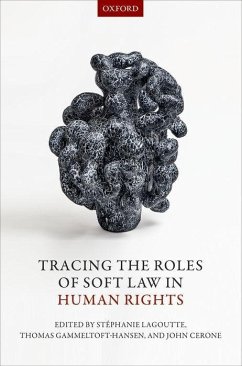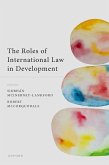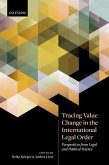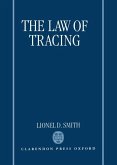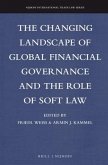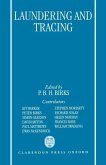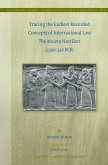Stephanie Lagoutte
Tracing the Roles of Soft Law in Human Rights
Stephanie Lagoutte
Tracing the Roles of Soft Law in Human Rights
- Gebundenes Buch
- Merkliste
- Auf die Merkliste
- Bewerten Bewerten
- Teilen
- Produkt teilen
- Produkterinnerung
- Produkterinnerung
Building on a thorough analysis of relevant case studies, this volume systematically explores the roles of soft law in both established and emerging human rights regimes.
Andere Kunden interessierten sich auch für
![The Roles of International Law in Development The Roles of International Law in Development]() The Roles of International Law in Development214,99 €
The Roles of International Law in Development214,99 €![The Protection Roles of Human Rights NGOs The Protection Roles of Human Rights NGOs]() The Protection Roles of Human Rights NGOs393,99 €
The Protection Roles of Human Rights NGOs393,99 €![Tracing Value Change in the International Legal Order Tracing Value Change in the International Legal Order]() Tracing Value Change in the International Legal Order172,99 €
Tracing Value Change in the International Legal Order172,99 €![The Law of Tracing The Law of Tracing]() Ali SmithThe Law of Tracing305,99 €
Ali SmithThe Law of Tracing305,99 €![The Changing Landscape of Global Financial Governance and the Role of Soft Law The Changing Landscape of Global Financial Governance and the Role of Soft Law]() The Changing Landscape of Global Financial Governance and the Role of Soft Law263,99 €
The Changing Landscape of Global Financial Governance and the Role of Soft Law263,99 €![Laundering and Tracing Laundering and Tracing]() Peter Birks (ed.)Laundering and Tracing293,99 €
Peter Birks (ed.)Laundering and Tracing293,99 €![Tracing the Earliest Recorded Concepts of International Law Tracing the Earliest Recorded Concepts of International Law]() Amnon AltmanTracing the Earliest Recorded Concepts of International Law199,99 €
Amnon AltmanTracing the Earliest Recorded Concepts of International Law199,99 €-
-
-
Building on a thorough analysis of relevant case studies, this volume systematically explores the roles of soft law in both established and emerging human rights regimes.
Hinweis: Dieser Artikel kann nur an eine deutsche Lieferadresse ausgeliefert werden.
Hinweis: Dieser Artikel kann nur an eine deutsche Lieferadresse ausgeliefert werden.
Produktdetails
- Produktdetails
- Verlag: Hurst & Co.
- Seitenzahl: 352
- Erscheinungstermin: 17. Januar 2017
- Englisch
- Abmessung: 236mm x 160mm x 30mm
- Gewicht: 703g
- ISBN-13: 9780198791409
- ISBN-10: 0198791402
- Artikelnr.: 47869926
- Herstellerkennzeichnung
- Libri GmbH
- Europaallee 1
- 36244 Bad Hersfeld
- gpsr@libri.de
- Verlag: Hurst & Co.
- Seitenzahl: 352
- Erscheinungstermin: 17. Januar 2017
- Englisch
- Abmessung: 236mm x 160mm x 30mm
- Gewicht: 703g
- ISBN-13: 9780198791409
- ISBN-10: 0198791402
- Artikelnr.: 47869926
- Herstellerkennzeichnung
- Libri GmbH
- Europaallee 1
- 36244 Bad Hersfeld
- gpsr@libri.de
Stephanie Lagoutte is Senior Researcher at the Danish Institute for Human Rights. She holds a Doctoral degree in law from the University of Paris 1, Pantheon-Sorbonne and a Ph.D. in Law from the University of Aarhus. She has taught and published within the field of European Human Rights Law, including on the reform of the European Court of Human Rights, human rights, and family law as well as religious freedom. Most of her recent work focuses on the duties and role of the state in human rights protection. She has coordinated research projects with partners from developing countries, especially in West Africa. In 2012-2014 she has been working in close cooperation with the UN Working Group on Human Rights and Business focusing on state duties under the UN Guiding Principles on Human Rights and Business. Thomas Gammeltoft-Hansen is Research Director at the Raoul Wallenberg Institute for Human Rights and Humanitarian Law. He holds a doctoral degree in law from Aarhus University, an MSc in forced migration from the University of Oxford, and an MPhil in political science from the University of Copenhagen. In addition to his academic work, Thomas Gammeltoft-Hansen serves as member of the Danish Refugee Appeals Board and has served as adviser and consultant to a number of international organisations, governmental institutions, and European NGOs. John Cerone is Paul Martin Senior Professor in International Affairs & Law at the University of Windsor Faculty of Law, and Visiting Professor of International Law at The Fletcher School of Law & Diplomacy, Tufts University. In 2014-15, he was Distinguished Chair in Human Rights & Humanitarian Law at the Raoul Wallenberg Institute, Lund University Faculty of Law. Professor Cerone has worked for UN agencies, the OSCE, and several international human rights NGOs, and has served as a legal adviser to international criminal courts. He has extensive field experience in conflict and post-conflict environments, including Afghanistan, Kosovo, Sierra Leone, and East Timor. He is an elected member of the International Institute of Humanitarian Law and has been a member of the International Committee of the Red Cross (ICRC) Expert Group on the Law of Occupation. He also served as Special Adviser to the first U.S. delegation to the UN Human Rights Council.
* Introduction: Tracing the roles of soft law in human rights
* 1: John Cerone: A taxonomy of soft law
* PART 1: Established human rights regimes
* 2: Kasey McCall-Smith: Interpreting international human rights
standards - treaty body general comments as a chisel or hammer?
* 3: Ekaterina Yahyaoui Krivenko: The role and impact of soft law on
the emergence of the prohibition of violence against women within the
context of the CEDAW
* 4: Mátyás Bódig: Soft law, doctrinal development and the General
Comments of the UN Committee on Economic, Social and Cultural Rights
* 5: Rachel Murray and Debra Long: The role and use of soft law
instruments in the African human rights system
* 6: Bruce Oswald: The Copenhagen Process: some reflections concerning
soft law
* 7: Peter Vedel Kessing: The use of soft law in regulating armed
conflict: from jus in bello to 'soft law in bello'?
* 8: Megan Bradley and Angela Sherwood: Addressing and resolving
internal displacement: reflections on a soft law "success story "
* PART 2: Emerging human rights regimes
* 9: Felipe Gómez Isa: The role of soft law in the progressive
development of indigenous peoples' rights
* 10: Léticia Villeneuve: Could the progressive 'hardening' of human
rights soft law impair its further expansion? Insights from the UN
Declaration of the Rights of Indigenous Peoples
* 11: Stéphanie Lagoutte: The UN Guiding Principles on Business and
Human Rights - a confusing smart mix of soft and hard international
human rights law
* 12: Christoph Good: Mission creeps: the (unintended) re-enforcement
of the actor's discussion in international law through the expansion
of soft law instruments in the business and human rights nexus
* 13: Anette Faye Jacobsen: Soft law within participation rights: tools
in development
* 14: Sally Holt, Zdenka Machnyikova and John Packer: The role of soft
law in minority rights protection and diversity management:
reflections from practice
* 1: John Cerone: A taxonomy of soft law
* PART 1: Established human rights regimes
* 2: Kasey McCall-Smith: Interpreting international human rights
standards - treaty body general comments as a chisel or hammer?
* 3: Ekaterina Yahyaoui Krivenko: The role and impact of soft law on
the emergence of the prohibition of violence against women within the
context of the CEDAW
* 4: Mátyás Bódig: Soft law, doctrinal development and the General
Comments of the UN Committee on Economic, Social and Cultural Rights
* 5: Rachel Murray and Debra Long: The role and use of soft law
instruments in the African human rights system
* 6: Bruce Oswald: The Copenhagen Process: some reflections concerning
soft law
* 7: Peter Vedel Kessing: The use of soft law in regulating armed
conflict: from jus in bello to 'soft law in bello'?
* 8: Megan Bradley and Angela Sherwood: Addressing and resolving
internal displacement: reflections on a soft law "success story "
* PART 2: Emerging human rights regimes
* 9: Felipe Gómez Isa: The role of soft law in the progressive
development of indigenous peoples' rights
* 10: Léticia Villeneuve: Could the progressive 'hardening' of human
rights soft law impair its further expansion? Insights from the UN
Declaration of the Rights of Indigenous Peoples
* 11: Stéphanie Lagoutte: The UN Guiding Principles on Business and
Human Rights - a confusing smart mix of soft and hard international
human rights law
* 12: Christoph Good: Mission creeps: the (unintended) re-enforcement
of the actor's discussion in international law through the expansion
of soft law instruments in the business and human rights nexus
* 13: Anette Faye Jacobsen: Soft law within participation rights: tools
in development
* 14: Sally Holt, Zdenka Machnyikova and John Packer: The role of soft
law in minority rights protection and diversity management:
reflections from practice
* Introduction: Tracing the roles of soft law in human rights
* 1: John Cerone: A taxonomy of soft law
* PART 1: Established human rights regimes
* 2: Kasey McCall-Smith: Interpreting international human rights
standards - treaty body general comments as a chisel or hammer?
* 3: Ekaterina Yahyaoui Krivenko: The role and impact of soft law on
the emergence of the prohibition of violence against women within the
context of the CEDAW
* 4: Mátyás Bódig: Soft law, doctrinal development and the General
Comments of the UN Committee on Economic, Social and Cultural Rights
* 5: Rachel Murray and Debra Long: The role and use of soft law
instruments in the African human rights system
* 6: Bruce Oswald: The Copenhagen Process: some reflections concerning
soft law
* 7: Peter Vedel Kessing: The use of soft law in regulating armed
conflict: from jus in bello to 'soft law in bello'?
* 8: Megan Bradley and Angela Sherwood: Addressing and resolving
internal displacement: reflections on a soft law "success story "
* PART 2: Emerging human rights regimes
* 9: Felipe Gómez Isa: The role of soft law in the progressive
development of indigenous peoples' rights
* 10: Léticia Villeneuve: Could the progressive 'hardening' of human
rights soft law impair its further expansion? Insights from the UN
Declaration of the Rights of Indigenous Peoples
* 11: Stéphanie Lagoutte: The UN Guiding Principles on Business and
Human Rights - a confusing smart mix of soft and hard international
human rights law
* 12: Christoph Good: Mission creeps: the (unintended) re-enforcement
of the actor's discussion in international law through the expansion
of soft law instruments in the business and human rights nexus
* 13: Anette Faye Jacobsen: Soft law within participation rights: tools
in development
* 14: Sally Holt, Zdenka Machnyikova and John Packer: The role of soft
law in minority rights protection and diversity management:
reflections from practice
* 1: John Cerone: A taxonomy of soft law
* PART 1: Established human rights regimes
* 2: Kasey McCall-Smith: Interpreting international human rights
standards - treaty body general comments as a chisel or hammer?
* 3: Ekaterina Yahyaoui Krivenko: The role and impact of soft law on
the emergence of the prohibition of violence against women within the
context of the CEDAW
* 4: Mátyás Bódig: Soft law, doctrinal development and the General
Comments of the UN Committee on Economic, Social and Cultural Rights
* 5: Rachel Murray and Debra Long: The role and use of soft law
instruments in the African human rights system
* 6: Bruce Oswald: The Copenhagen Process: some reflections concerning
soft law
* 7: Peter Vedel Kessing: The use of soft law in regulating armed
conflict: from jus in bello to 'soft law in bello'?
* 8: Megan Bradley and Angela Sherwood: Addressing and resolving
internal displacement: reflections on a soft law "success story "
* PART 2: Emerging human rights regimes
* 9: Felipe Gómez Isa: The role of soft law in the progressive
development of indigenous peoples' rights
* 10: Léticia Villeneuve: Could the progressive 'hardening' of human
rights soft law impair its further expansion? Insights from the UN
Declaration of the Rights of Indigenous Peoples
* 11: Stéphanie Lagoutte: The UN Guiding Principles on Business and
Human Rights - a confusing smart mix of soft and hard international
human rights law
* 12: Christoph Good: Mission creeps: the (unintended) re-enforcement
of the actor's discussion in international law through the expansion
of soft law instruments in the business and human rights nexus
* 13: Anette Faye Jacobsen: Soft law within participation rights: tools
in development
* 14: Sally Holt, Zdenka Machnyikova and John Packer: The role of soft
law in minority rights protection and diversity management:
reflections from practice

